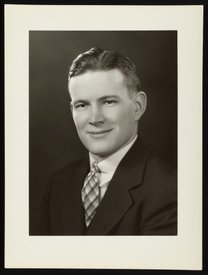Portrait of Charles C. Price in Japan
- 1962
Portrait of American chemist and American Chemical Society president (1965) Charles C. Price (1913-2001). This portrait was taken in Kyoto, Japan in 1962, while Price was teaching at Osaka University and Kyoto University as a Fulbright Professor. An instructor at the University of Illinois at Chicago, the University of Notre Dame, and the University of Pennsylvania, Price is best known as a pioneer of polymer science and inventor of polyether polyurethane foam rubber, which became widely used in sponges, insulating building materials, flotation devices, and packaging.
| Property | Value |
|---|---|
| Photographer | |
| Place of creation | |
| Format | |
| Genre | |
| Extent |
|
| Subject | |
| Rights | In Copyright |
| Rights holder |
|
| Credit line |
|
Institutional location
| Department | |
|---|---|
| Collection | |
| Physical container |
|
View collection guide View in library catalog
Related Items
Cite as
R. Kohno Studio. “Portrait of Charles C. Price in Japan,” 1962. Charles C. Price Photograph Collection, Box 1. Science History Institute. Philadelphia. https://digital.sciencehistory.org/works/ztd4own.
This citation is automatically generated and may contain errors.






